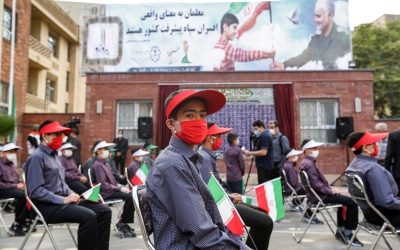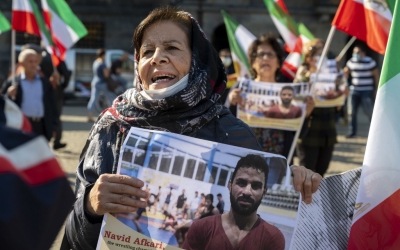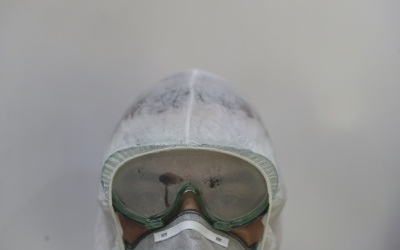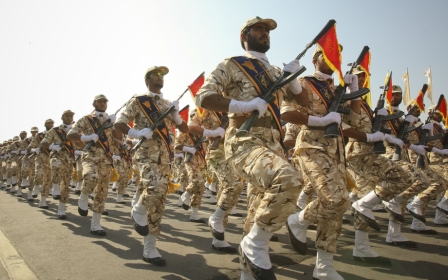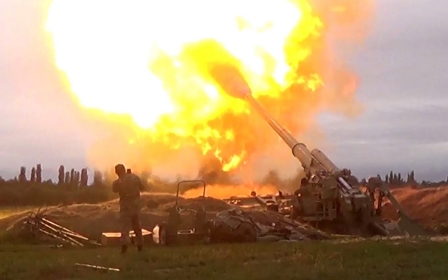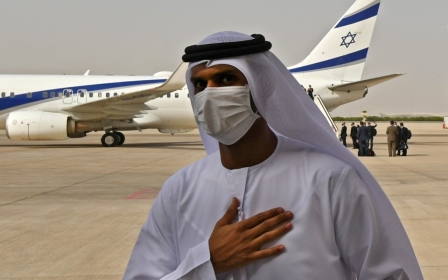Iranian press review: Revolutionary Guard equips speed boats with suicide drones
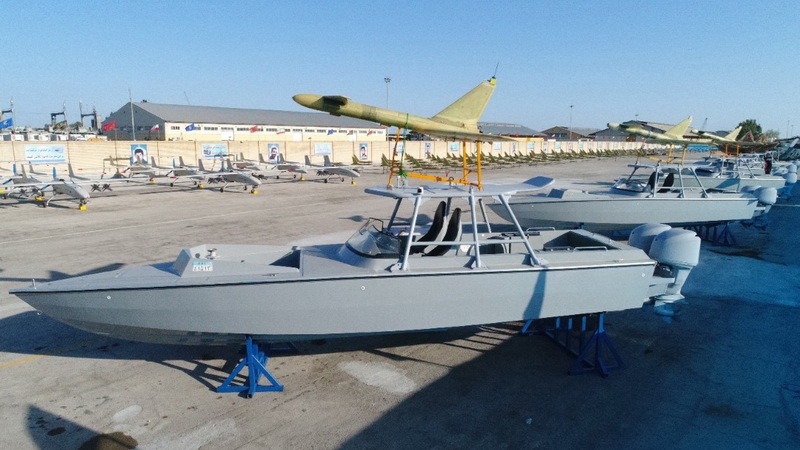
IRGC deploys suicide drones to its Gulf speed boats fleet
Iran’s Islamic Revolutionary Guard Corps (IRGC) has deployed 70 Ababil-2 suicide drones to the navy of the country’s elite force, which controls its territorial waters in the Gulf and the Sea of Oman, the IRGC-affiliated Fars news agency has reported.
IRGC’s fast attack boats, previously equipped with cruise missiles, were adapted to carry the drones, which are rocket-assisted and do not require a runway to take off.
New MEE newsletter: Jerusalem Dispatch
Sign up to get the latest insights and analysis on Israel-Palestine, alongside Turkey Unpacked and other MEE newsletters
Ababil-2 was first produced in Iran in 2000 as a low-cost locally-manufactured spy drone. It was also used as an air target imitator to train Iran’s air defence force.
According to Fars, a new type of combat drone has also been delivered to the IRGC naval force. Mohajer-6 is a new generation of combat drones that carry four guided bombs.
Fars reported that at the beginning of October, 188 drones of different types were delivered to the IRGC naval force.
Since the late 1980s, deploying speed boats fitted with missile launchers, RPGs and heavy machine guns has been the IRGC’s main strategy in asymmetric warfare against the presence of the US navy in the Gulf.
However, following Washington’s unilateral withdrawal from the nuclear deal with Iran in 2018 and the rising tensions between the two countries, the IRGC has increased its investment in developing new generations of speed boats, as well as fitting the old generations with new missiles.
On Friday last week, Ali Fadavi, a naval officer and the deputy commander of the IRGC, told Mehr news agency that the IRGC navy has been developing new combat fast boats that can reach a speed of 100 knots (185 kmph).
In an interview with Mehr in commemoration of the anniversary of the beginning of the Iran-Iraq War, Fadavi added that the IRGC is also developing new systems to improve the accuracy of its ballistic missiles.
Former death row inmate talks of his time in prison
The Shahrvand daily has interviewed a former prisoner who was on death row for four years.
The onetime inmate, referred to as Soheil, was sentenced to death when he was 16 years old after he killed another young boy with a knife during a street fight, the daily reported.
According to Islamic law (Sharia), retribution is the punishment for homicide, unless the family members of the slain person forgive the murderer or demand compensation.
Soheil, who was under 18 when he committed the crime, was first sentenced in a juvenile detention centre for two years, then transferred to a prison. That was where, for the first time, he saw inmates on death row, who went through a door and never returned.
“It was only in the prison that I understood the meaning of the death penalty and the weight of this heavy punishment,” Soheil told the newspaper.
“In the juvenile centre I felt like I would soon return to my parents. In the prison, after seeing other inmates on death row, I realised for the first time what was going to happen to me,” he added.
Attempts by his parents to receive forgiveness from the family of the person killed by Soheil had repeatedly failed, and Soheil saw the gibbet for the first time.
“My feet could not move when I saw the hanging rope,” Soheil said.
“They took me to the gibbet and put the rope around my neck. I just wanted everything to finish as fast as possible, but those frightening moments did not end fast.”
Soheil was not executed that day because neither family members nor their lawyer were present at the time of carrying out the sentence.
Soheil experienced something similar three more times, with the execution postponed for a different reason each time. By this point, he was no longer happy to be alive.
“All I wanted was death. Believe me, I was not happy at all because experiencing those moments was worse than death,” he explained.
In the end, and in a merciful twist, the family of the slain person agreed to forgive Soheil in return for compensation. Soheil’s parents sold two houses to pay the amount and he was freed after spending five years in prison.
Capital punishment has lately been at the forefront of social debates in Iran after an online campaign was launched in July demanding a stop to the execution of three men arrested following the 2019 unrest in Iran.
The execution of national champion wrestler Navid Afkari in September has also fuelled the anti-death penalty movement in Iran.
In 2019, Iran had the second highest number of executions after China, according to Amnesty International. Saudi Arabia, Iraq and Egypt stand after Iran as the leading executioner states in the world.
Iran at risk of coronavirus ‘tsunami’ as third wave hits
The third wave of coronavirus in the Middle East has been deadliest in Iran, as official numbers show new records of daily death tolls and new cases in the country, which has been the hardest hit in the region.
On Wednesday, health ministry spokeswoman Sima Sadat Lari reported 239 deaths from Covid-19 in 24 hours, the highest daily number of fatalities since the beginning of the spread of the virus in Iran in March.
Iran’s total death toll stands at 27,888, while the number of cases is at 488,236.
Iran’s Covid-19 cases surged again in mid-September, while the country suffers from a shortage of influenza vaccines due to US sanctions. Health experts had warned that the vaccine shortage for high-risk groups would lead to an increase in the Covid-19 death toll in Iran.
On Saturday, in an effort to curb the resurgence of the virus, officials in Tehran implemented new restrictions, including a shut down of universities, schools, mosques, museums, cinemas, cultural centres, tea houses, cafes, sports clubs and Friday prayers in the capital, local media reported.
Meanwhile, the religious authorities banned all Arbaeen pilgrimages inside the country, ISNA news agency reported. Every year, large groups of pilgrims from across the country walk to the shrine of the eighth Shia Imam in the city of Mashhad to celebrate Arbaeen.
Deputy Health Minister Iraj Harirchi also announced that wearing a face mask in all public areas in Tehran would be mandatory as of Saturday, and people violating the new measures would be fined.
Despite new restrictions, experts believe that the country needs a total lockdown to contain the new wave of the pandemic.
The head of Tehran's city council, Mohsen Hashemi, urged a two-week total shutdown for the capital to curb the sharp increase of deaths from the virus.
“One-week closure of some businesses is insufficient. To effectively and rapidly control the situation, a general lockdown should be imposed on Tehran for two weeks,” Hashemi wrote on Twitter.
“We are on the verge of experiencing a tsunami of coronavirus.”
*The Iranian press review is a digest of reports that are not independently verified as accurate by Middle East Eye.
Middle East Eye delivers independent and unrivalled coverage and analysis of the Middle East, North Africa and beyond. To learn more about republishing this content and the associated fees, please fill out this form. More about MEE can be found here.


